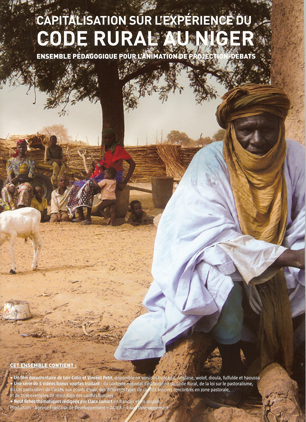- Land grabbing
-
Land Policies
- For a new agricultural land policy in France
- Land Policies and Agrarian History in Europe
- The agricultural land policies of France in the 20th century
- Land issues in West Africa. Briefing notes.
- Agrarian Reforms in the World
- Lessons Learned from Niger’s Rural Code
- Land Policies and Agrarian Reform. Proposal Paper.
- Forest
- Water
- Local Land Management
- WFAL - World Forum on Access to Land 2016
- Other International Conferences and Forums
- AGTER’s Thematic Meetings - Videos
- Interviews with some members of AGTER
- Training - Education
- Education - Study trips
- Education - Training modules
- Editorials - Newsletter AGTER
- Protect the environment and ecological balances
- Develop participation in national and local decision making
- Respect basic human rights. Fight against inequality
- Establish effective global governance. Build peace
- Ensure efficiency of agricultural production and end hunger
- Develop and maintain cultural diversity
- Consider the needs of future generations. Good management of the commons
Title, subtitle, authors. Research in www.agter.org and in www.agter.asso.fr
Full text search with Google
Lessons Learned from Niger’s Rural Code
Folder presentation
Funding organizations: Agence Française de Développement (AFD)
Folder Contributors: Association pour contribuer à l’Amélioration de la Gouvernance de la Terre, de l’Eau et des Ressources naturelles (AGTER), Inter-réseaux Développement Rural, Association pour le Développement de l’Enseignement du Perfectionnement et de la Recherche à l’Institut national agronomique Paris-Grignon (Adeprina), Association pour la Redynamisation de l‘Elevage au Niger (AREN), e-sud development, LandNet West Africa
Why this project ?

This work is the result of a collective project initiated by AGTER (Association pour l’Amélioration de la Gouvernance de la Terre, de l’Eau et des Resources Naturelles – Association for the Improvement of Land, Water and Natural Resources Governance), E-Sud Development, AREN (Association pour la Redynamisation de l‘Elevage au Niger – Association for the Revitalization of Livestock Breeding in Niger), and the LandNet West African network. The project was initiated within the context of the Projet de renforcement des capacités des réseaux d’organisations agricoles en matière de politiques agricoles, alimentaires et rurales (Paar Network – Capacity building project for agricultural organizations networks, focusing on agriculture, food and rural policies), funded by the French Development Agency. The contractor for this project is the ADEPRINA/Inter-réseaux Développement rural. Only the authors may be held accountable for the content of this work.
About twenty interviews were carried out to create this set of educational tools. The film was shot in about three weeks in June 2010, just before the winter season. It was edited in September, and additional documents were also written. The first screenings of the film took place later that year in November in Niger, Burkina Faso and Senegal.
Natural resource management systems are currently undergoing some redefinition, and decentralization policies are progressively being implemented in West Africa. In this context, it is crucial to act by contributing information to local, national or regional discussions with specific examples, while avoiding preconceived patterns; this educational package was designed in this perspective. Readers and viewers should find here some useful input to inform their own questions and perceptions of the situation.
Furthermore, the Rural Code example of Niger is a deliberate choice. This original process succeeded, through 20 years of a participatory approach, in reducing both the number of land conflicts and their violence. It also contributed to improving patterns of governance at the different territorial levels. The Rural Code is now a benchmark for rural development policies in Niger.
This kit comes with a film produced in June 2010, just before the winter season: “From conflict to consultation: the Rural Code experiment in Niger” (running time: 39 minutes with 5 additional bonuses). The film is available in English, French, Fulfuldé, Haoussa, Djoula and Wolof. To obtain a copy of the educational Package, including the DVD, please contact AGTER.
What is the content of this educational package?
The thematic papers and film have been designed as two complementary tools. The papers will help viewers look further into some of the topics that the film addresses, and will also help provide practical data (facts and figures, diagrams, maps, etc.) about the reality of Niger’s Rural Code.
The papers are meant to foster a more theoretical and critical approach to the reality of the Rural Code. They are a key tool for moderators, intended to lead discussions with the audience and to go further in the debate.
The main film is not meant to present the Rural Code in full detail, but rather provides useful input for discussions about how to implement a policy for the management of natural resources. Viewers can also compare their situation with the specific Nigerien one.
By presenting some of the most frequent categories of land disputes in Niger, as well as the main institutional and technical tools designed to respond to those conflicts, the film provides some practical examples. It presents the work carried out by the different local land commissions. The film deliberately emphasizes the voices of different stakeholders that participate in this process on a daily basis: farmers, herders, traditional chiefs and local officials are the main characters of the film.
The film does not pretend to discuss the strengths and weaknesses of the Rural Code’s system, but invites the audience to question the whole process.
Table of contents
Papers / Documents for wide distribution
-
Niger’s Rural Code: Bibliography and Interesting Websites for Further Information
-
Shortcomings of Niger’s Rural Code and Challenges for the Future







 Agter is part of the Coredem
Agter is part of the Coredem